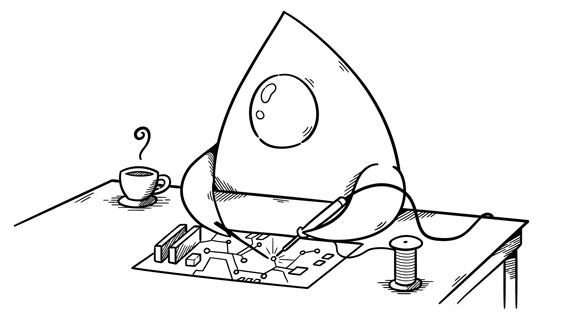Anyone with children is familiar with the struggle of trying to introduce a new hobby or interest to their kid. They don’t care. They know what they like, and that new thing you want them to try —- yeah, that’s boring.
Take coding. Why should your kid care about coding? Why should you, for that matter? Well, for starters, over 90% of jobs require digital skills, and millions of jobs every year require some level of coding1. If that’s not enough justification, coding helps children learn “creativity, collaboration, generosity, and open-mindedness” when approaching new problems2.
So coding is good for kids. But how do we get them to give it a chance?
Make Coding Normal
Children take their cues from the people around them. They watch us (more closely than you might realize) and pick up on what is a normal part of life and what is extra, boring, or undesirable.
Chances are, if you care about getting your kid into coding, you’re probably into coding yourself, at least at some level. If that’s true (or even if it’s not), share coding-related hobbies with them! (Sharing your interests and hobbies with your child has tons of added benefits, including bonding and self-esteem3, so really this goes for pretty much any hobby.) Don’t make it an assignment or a chore. Start out by just letting them be in the room while you work on something.
Say you’re building a home arcade machine, fixing a friend’s computer, making a web or mobile app in your free time, or any of dozens of other hobbies that involve some level of programming — invite them to be in the room. Answer their questions. Let them help! Their interest and curiosity will expand from there.
Get Them Monthly Project Boxes
I’m not plugging a specific company or product, but we’ve all seen the ads on children’s YouTube channels and other websites. There are all kinds of monthly project kits you can subscribe to, including some with an engineering focus. Kids really do get excited when a monthly project kit arrives, and here’s the cool part: In the beginning, you’ll help them work on it. After a few, they’ll tell you they want to do it themselves, asking for help only on specific parts. Eventually, you’ll see them start to run into a problem, and instead of putting it down or asking you, they’ll suss it out for themselves. That kind of problem-solving is a critical skill for programming as well as engineering.
Start Them Off Easy
My child’s first forays into programming were at NASA Explorer Camps at age 5. They have these little robots they let the kids play with that can be programmed to do twirls, spins, and rolls by using sequences of colors on a straight line strip. The robot rolls over the strip, reads the code, and executes the actions4. In addition to these classes for the younger children, NASA has more advanced space camps, including Robotics, Habitat Design, and other camps that teach kids functional, useful skills that NASA engineers use every day. Kids can go for a single day, 3-day weekend camps, or even full week camps, where they are immersed in engineering, robotics, programming, and really cool equipment. They also spend this time surrounded by other young people interested in these fields and skills, and they work with NASA astronauts and The Robonauts (advanced robots used in actual space missions). Not near a NASA campus? Try a local university; many have summer camps for kids with a focus on STEM fields and even programming.
And you don’t even need to leave home to find projects like these. There are a plethora of tools and toys that can feed directly into an interest in coding and related engineering skills. LEGO has been one of the standard building blocks for developing creativity, basic problem solving, and even fundamental engineering skills — for good reason. More importantly, over the years LEGO has expanded the reach of what their kits offer. One of the more recent developments is LEGO Robotics. These kits let children explore the basics of robotics, moving components, and the programming to get custom behaviors. These are an excellent practical tool for kids to dive into once they’ve shown some interest in programming. They could even be a good place to start for older children.
And, of course, there are also plenty of apps designed to get kids started with — and interested in — coding. Swift Playgrounds, ScratchJr (or Scratch, for older kids), and similar tools let kids explore concepts without needing to worry about language or syntax. There are also mobile video games with a similar interface.
Make It a Social Experience
As already mentioned, NASA and some academic institutions have camps that introduce children to programming and similar fields. If you’re looking for something that will last longer than a week at camp, check out local, state, and regional robotics clubs and competitions, which have been on the rise for years. Organizations like For Inspiration and Recognition of Science and Technology (FIRST) have chapters all over the world and host regular ranked competitions for various age brackets5.
These competitions and clubs create unique opportunities for children to socialize with other kids who have interests in these fields and skills. This kind of socialization also teaches children valuable tools for working together to find solutions to problems as they inevitably crop up.
Don’t Make It a Lecture or a Lesson
This is a tough one for a lot of us. If you work in engineering, software, tech, or an academic field, you might want to explain (read: over-explain) the intricacies of coding to your kid. Don’t. It’s important for children to have the freedom to explore and discover6. We don’t need to explain variables, Boolean logic, or objects to them (yet!). If you make it seem like a class, they’ll tune out immediately and start eyeballing that iPad on the table near you.
In my experience, children tend to demonstrate a much more compelling interest if they’re allowed to explore it but don’t feel pressured to do so. If you tell your kid they’re going to play in soccer camp and that you already signed them up, they’ll be resentful and push back at every game. If you let them watch soccer, play with their friends outside, maybe even let them try soccer video games, there is a real chance they’ll ask you about soccer camp or if you’ll play soccer with them. This empowers children to be an “agent in shaping their own lives,” and allows them to be more invested in their participation7.
In short, sometimes the best approach is to dangle an enticing idea in front of them and let them decide if they want to bite. If you’ve followed some of the other ideas discussed here, the likelihood is significantly greater that they’ll develop that interest and want to further explore it.
Think of the Future
The world of coding isn’t going anywhere. It is constantly growing and changing, especially with the increase in AI (see our articles about AI separately), but that makes it even more important to involve kids in coding early.
The kids growing up in this increasingly AI-driven world will be the generation that molds what AI will become and how it will influence the future of technology and engineering. No one really knows what tomorrow will bring to technology. We can guess, but we have probably only just touched the surface of what AI can and will contribute.
A lot of people express concern that engineering and especially coding will be obsolete with the introduction of AI, but the more likely truth is that AI will help us with efficiency by eliminating redundant and repetitive tasks and supporting more advanced robotics and more robust evaluation tools8. The key word in that last sentence is “tools.” These are advanced technologies that human engineers of the next generation will use to make leaps in tech advancements. Engineers and programmers will be the creative minds that give us applications of the new, more efficient simulation and generative tools9.
The world becomes more digital every day, and understanding coding will become more and more integral as we progress. I, for one, love that idea and look forward to seeing what the next generation will discover.
-
New Report: 92% of Jobs Require Digital Skills, One-Third of Workers Have Low or No Digital Skills Due to Historic Underinvestment, Structural Inequities 2023 ↩
-
The Importance of Child-Led Learning in Early Childhood Education 2024 ↩
-
Key factors for child participation – an empowerment model for active inclusion in participatory processes 2023 ↩


